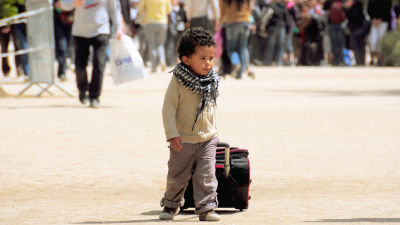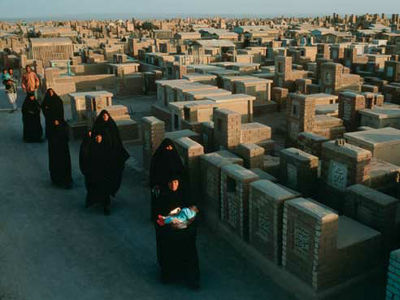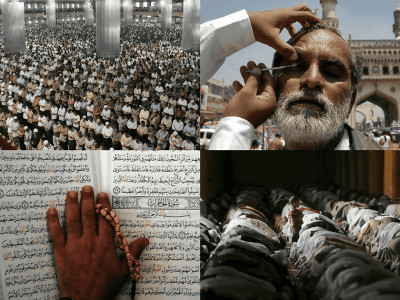Pandemic of new coronavirus is trying to change even Muslim life

by
With the epidemic of the new coronavirus infectious disease (COVID-19), movements to maintain social distance have been strengthened and compulsory city blockade has been implemented in various countries around the world. The influence of the pandemic extends to daily life, with many companies introducing telecommuting and schools starting online lessons, “The new coronavirus pandemic is a believer of Islam. It also has a big impact on the lives of Muslims . '
How coronavirus challenges Muslims' faith and changes their lives
https://theconversation.com/how-coronavirus-challenges-muslims-faith-and-changes-their-lives-133925
The family is an important component of Islam, and Muslims tend not only to have a relatively large number of family members, but also to maintain a close relationship with a wide family. Muhammad , a prophet in Islam, told believers to maintain strong family ties. The Islamic scriptures of the Koran also say, 'Be generous with your relatives,' 'Be considerate of the elderly,' and more.
These teachings have made Muslims a habit of living with large families and visiting relatives on a regular basis, but in keeping with their social distance strategies, Muslims have no choice but to change their habits. I am. It is said that Muslims have abandoned visiting relatives who live in other places, as each country has restrictions on non-essential outings and movements between regions. Similarly, visiting a sick person is considered a good thing in Islam, but since a patient with COVID-19 cannot be visited, it seems that Muslims contact the patient by phone, message or SNS.
Also, in the Muslim community, handshaking and hugging are frequently exchanged, especially in mosques , but from around March Muslims also began to avoid hugging, and they have mixed emotions in situations where their customs have been limited. It seems that

by
For a long time, cleanliness has been very important in Islam, and the Quran also instructed believers to keep their clothes clean, and it is also written that 'God loves clean people.' This is expected to reduce the risk of Muslims being infected with the new coronavirus and provide benefits in combating the COVID-19 epidemic.
Muhammad encouraged believers to wash their hands before meals, take a bath once a week, brush their teeth daily and care for their nails and genitals. In addition, it is necessary to cleanse the body before worship 5 times a day, and strict followers wash their fingers, face, feet and hair.

Praying in the mosque is important for Muslims to gain the feeling of being in a sacred being and with other believers, but worshiping in close proximity is very important under the COVID-19 pandemic. Is dangerous to Mosques have been closed in Iran, Indonesia, Turkey, etc., and in
Fortunately for Muslims, individual prayer and worship play a major role in Islam, and it is possible to worship at home even if the mosque is closed. In addition, mosques in various countries have also started an attempt to preach online at the time when usually Friday worship is held.

It is believed that
The 2020 Ramadan is April 23-May 23. You will avoid eating and drinking during the fast from sunrise to sunset, but the meal after sunset is called Iftar, and Muslims invite friends and family to enjoy a sumptuous meal. In addition, during Ramadan, a special worship service called Tarawee is held at the mosque, and a grand festival called Id al-Fitr is held to celebrate the end of Ramadan, but Islamic organizations of each country are responsible for the pandemic of COVID-19. Affected, many people are canceling the gathering event.
Pilgrimage to Mecca is called Hajj, and the pilgrimage season for 2020 is from late July to early August. Every year millions of Muslims gather from around the world during the pilgrimage period, but the Saudi government has suspended entry from infected countries including Japan since March 2020, and Hajj cannot perform in 2020. There is a possibility. If the pilgrimage to Mecca is stopped, the pilgrims who paid the full amount of the fee in advance will be seriously damaged, and there may be a large employment loss in the pilgrimage industry.

by Al Jazeera English
Discussions in the Islamic sphere surrounding the new coronavirus are complex. Some Muslims claim that the new coronavirus was created by God to warn and punish humanity about consumerism, environmental destruction, overpopulation, etc., and the battle with the pandemic is useless I believe that.
On the other hand, most Muslims argued that the emergence of the new coronavirus was something that humanity could not control, but that the spread of illness could be prevented by human action, arguing that it is possible to fight the pandemic. It is said that there is. Muhammad also mentioned quarantine measures for infectious diseases, `` If you hear that an infectious disease (pesto) is spreading somewhere, do not go there, if it is spreading in your area, go there. You must not leave. '
Islam teaches that it is a test to make Muslims stronger about the difficult things that come to life. Muhammad also advises that when wealth is lost in hardship, it is considered a charity and those who lose their lives are considered martyrs.

Related Posts:
in Note, Posted by log1h_ik







